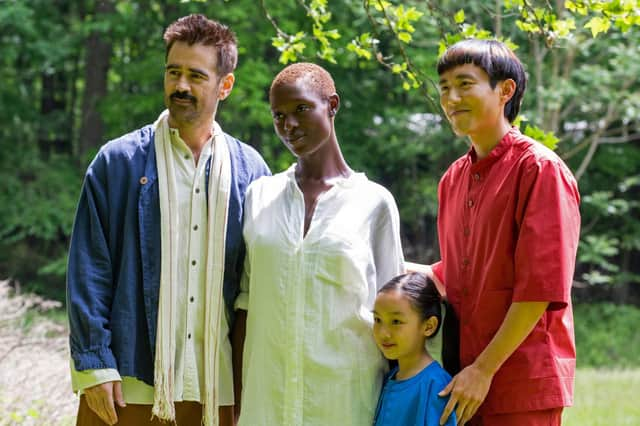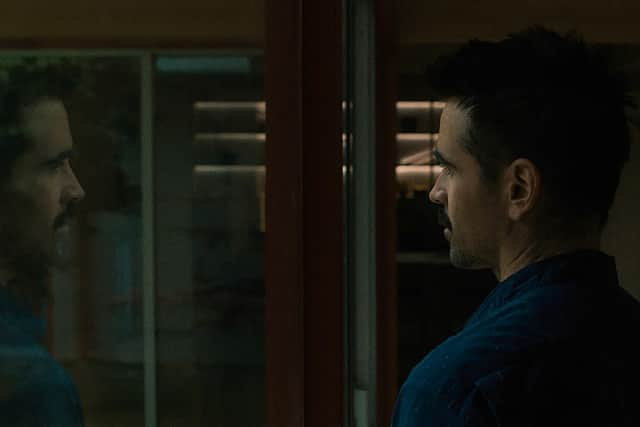Kogonada on After Yang: 'Like Yang, I feel caught between worlds'


Closing this year’s Edinburgh International Film Festival, Kogonada’s new film After Yang is a haunting sci-fi film about memory, grief and familial estrangement, but for three glorious minutes over the opening credits it features the sight of Colin Farrell dancing. And not just dancing, but doing high-energy syncopated routines with his fictional family as they participate in a nationwide virtual dance-off that’s simultaneously joyful and, once you start paying attention to the instructions they’re receiving from the synthesised voice hosting the competition, a little bit sinister.
“It was brilliant,” says Kogonada when I ask about shooting the scene and starting the film this way. “I love dance in film. I just think it represents something we’re all longing for.”
Does he mean a sense of connection?
Advertisement
Hide Ad“Yeah. Seeing this family, literally as a team, working out, being in sync, and then seeing all the families in this world, which has been a little bit devastated – which is a little bit in the background – I just thought it would be a celebratory way of seeing the families who have survived working together, trying to reconnect, especially knowing that the rest of the film was going to be about the dissolution of a family.”
That dissolution happens when the title character malfunctions. Yang (played by Justin H Min) is an android, or “techno-sapien”, who’s been purchased by Farrell’s Jake and his wife Kyra (Jodie Turner-Smith) as a surrogate big brother designed to help their adopted Chinese daughter Mika (Malea Emma Tjandrawidjaja) connect with her Chinese heritage.
On one level, the film – which Kogonada adapted from Alexander Weinstein’s short story Saying Goodbye to Yang – serves up an intriguing meditation on how intertwined the concepts of cultural heritage and identity are, but also how manufactured they can sometimes feel. Given Kogonada was born in South Korea, raised in the American midwest, and only ever goes by his pseudonym (a riff on his hero Yasujirō Ozu’s regular screenwriter Kôgo Noda), was that part of the appeal?
“Absolutely. I feel so caught between worlds and have done so all my life,” he says. “Between East and West, America and Korea, and, you know, our history goes through Japan as well, so for me there’s this sort of construct of Asian-ness and what that even means. In some ways I relate more deeply to Yang than Asian characters [in other films].”
Farrell’s character also resonated. When it becomes apparent there’s no easy fix for Yang, Jake becomes obsessed with finding a way to repair him, which leads him on a strange odyssey as he gains access to Yang’s digital “memories” and gets a new perspective on Yang, himself and the family he's in the process of losing. “I like the idea that the father starts this journey by trying to fix this artificial son, but in the process, is sort of repairing himself.”
On the line from Los Angeles, where he lives with his wife and two children, Kogonada says he’s been thinking a lot of about this word “repair”. “If something is broken it needs to be reconnected to something, like 're-pairing,'” he says. For Jake, who sells tea for a living, his passion has become a business and, latterly, a slog. “It needs rekindling and I’ve had that in my own life,” he says. “I think all of us who are involved in film, when it just becomes your business, you can really feel disconnected. And once you become disconnected to one thing, which has provided meaning, it can spread all around and suddenly you can feel disconnected from other things.”
Advertisement
Hide AdThe double whammy of making After Yang and directing half of the recent Apple TV+ series Pachinko (an epic project on which he had to deal with all the additional stresses of Covid protocols) left him feeling in need of some repair himself. So he drew up a list of 140 films from the silent period of Asian cinema right up to the 1960s and has been working through it ever since. “Just to remind myself why I wanted to make films.”
He went through a similar crisis a decade or so ago when he was drifting through academia struggling to write a PhD on Ozu. He couldn’t find a way to dissect the thing he loved using academic language so began making and posting video essays online instead – short, perceptive, gorgeously edited films about the auteur directors he was obsessed with and the patterns in their work. “It was so much more animated – it felt like I was re-animating the thing I love.”


Advertisement
Hide AdThe video essays got him a lot of attention, a lot of commissions, and he made good on their promise with his debut feature Columbus in 2017, an exquisitely constructed story about love, loss and architecture that was also about learning to reconnect with the world by looking at it in a different way.
After Yang continues that theme, using its sci-fi conceit to show how the fragmentary nature of memory informs who we are. Yang’s “memories” function like movies in this way and the film subtly reminds us of their importance during a flashback scene in which Farrell’s character recalls falling in love with tea after watching a documentary about a man searching for the best tea in China. It’s a scene that also gifts the world Colin Farrell doing a Werner Herzog impression. As it happens the film he's talking about really exists – it’s called All in This Tea – and the “German friend” he refers to when he’s describing how drinking tea can connect you to a whole world is really Herzog.
“It’s exactly as described in the film,” says Kogonada. “And Colin was so great. He actually does a pitch-perfect impression but toned it down because he didn’t think Jake would be quite as proficient. But it was just a delight to see him embody Herzog for this brief moment.”
After Yang screens at the Edinburgh International Film Festival on 20 August. For tickets and more information see www.edfilmfest.org.uk